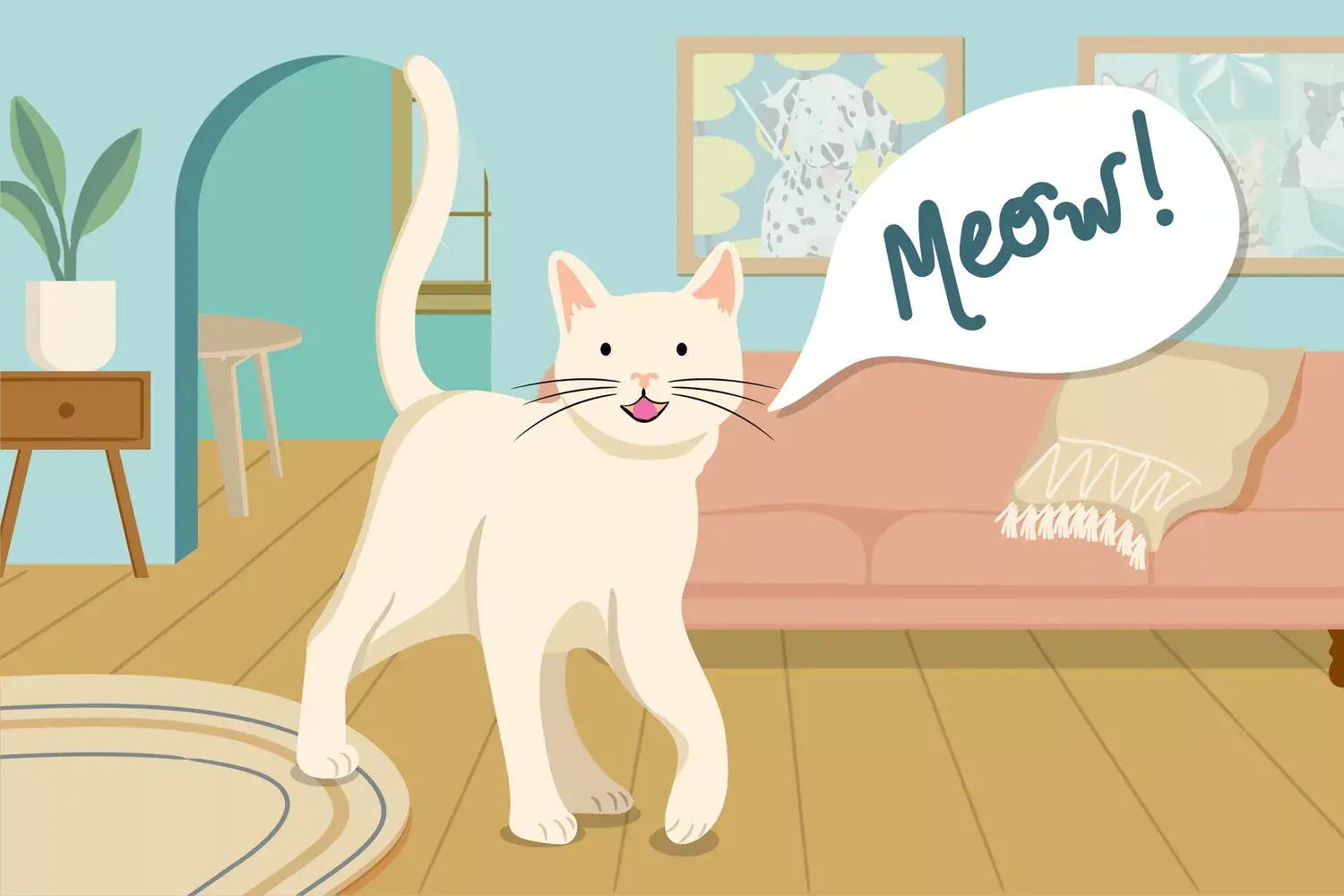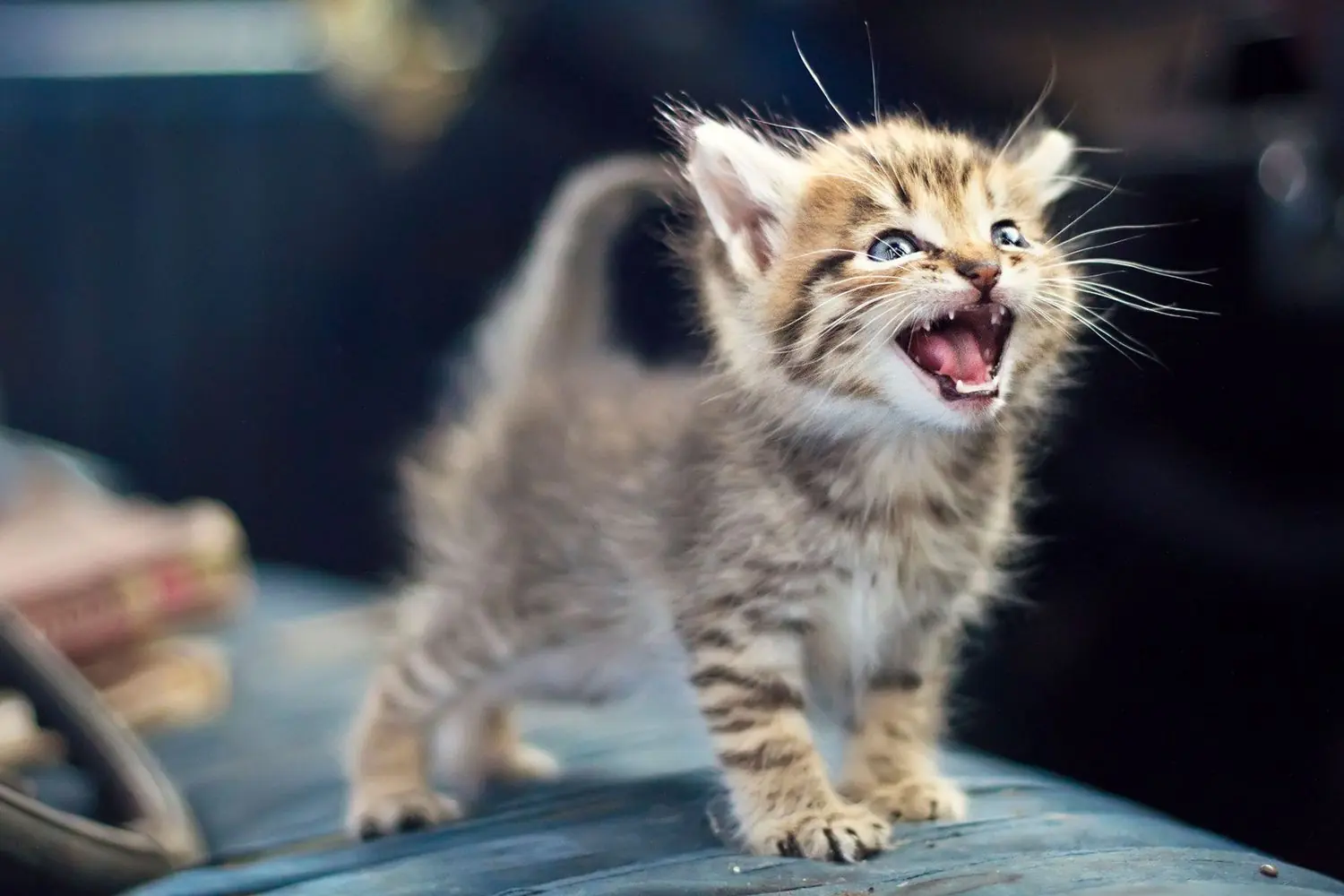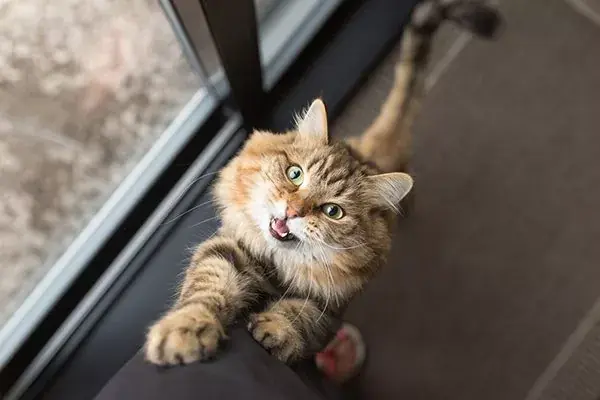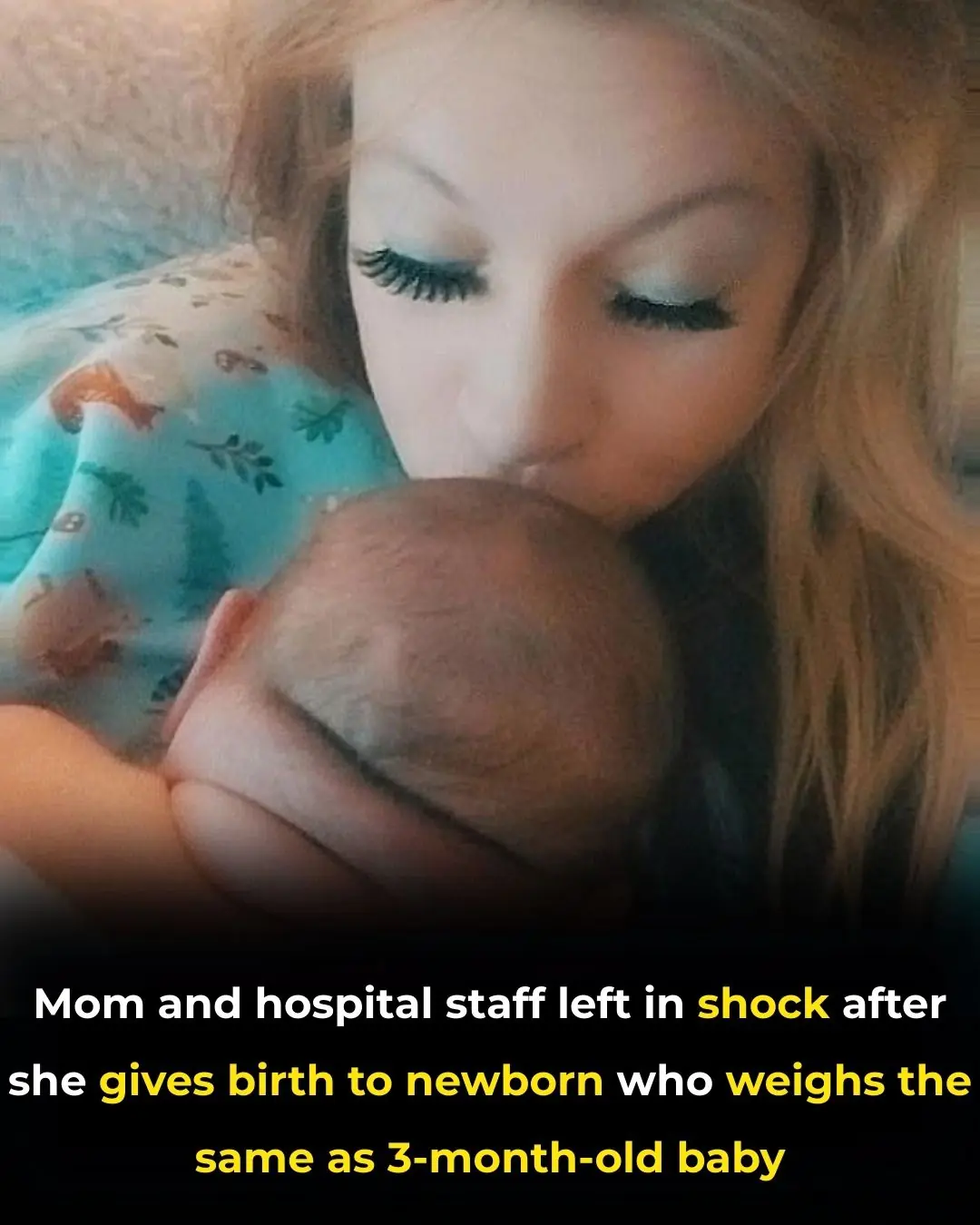
Meowing Mayhem: Why Your Cat is Meowing So Much and What You Can Do About It
When a cat excessively vocalizes with meows, it prompts natural curiosity about their message and the reason behind their heightened meowing behavior. Essentially, meowing primarily serves as a means of communication between cats and humans.
Indeed, meows are predominantly used in interactions with humans, with less frequent usage in cat-to-cat communication. According to Sheena Haney, DVM at Koala Health, cat-to-cat communication relies more on cues like body language, eye contact, growling, and hissing.
If your cat's excessive meowing leaves you yearning to understand its meaning, here's a guide to help decode your feline companion's vocalizations.

9 Reasons Why Your Cat Meows Excessively
If you've ever responded with a meow to your cat (I confess I have!), Haney acknowledges what's probably already apparent—your cat doesn't understand your words. Nonetheless, there's no harm in engaging in conversation with your feline friend. Moreover, according to scientists, speaking to your cat in a high-pitched, affectionate tone, similar to speaking to a baby, can yield the best outcomes.
Setting aside the language barrier, cats, much like humans, express themselves extensively when they want or need something. "Understanding and observing your cat's sounds and body language is an excellent method for strengthening your bond with and caring for your pet," Haney suggests. Among the most common reasons for meowing are:
- Seeking attention: If your cat is extra chatty, it may be a sign they simply want your attention or to play. When it works, your furry friend notices and associates meowing with a positive feedback loop.
- Saying hello: It may not feel like an act of love when a cat is meowing excessively, but it's one of the best ways they know how to say, "Hi! I missed you!" (And "Where have you been? You smell weird. Did you bring me a treat?")
- Asking to be fed or to have another treat: While beckoning for more food is hard to deny, it's best to stick to a feeding schedule. "Offering a snack every time she meows may pave the way for weight gain," Haney says. It also rewards the meowing and may make it worse.
- Fear, anxiety, or stress: Some cats may become subdued or frozen in posture when stressed, while others become more vocal, restless, or agitated.
- Pain or discomfort: Anything from arthritis to an ingrown nail could put the "ow" in "meow." Usually a sign of contentment, your cat might purr when in pain, too. So, look out for clues such as your cat excessively grooming one spot or changes in mobility.
- A health condition: Unfortunately, there may be a more serious cause behind your cat's meowing. "A geriatric cat may vocalize due to confusion or disorientation. This can be the result of cognitive dysfunction, much like humans with Alzheimer's disease," Haney notes. She adds that an increase in meowing could also point to other conditions, such as hyperthyroidism.
- They're in heat: And in response, intact male cats will meow excessively if they hear or smell an intact female cat in heat.
- They're pregnant: Female cats could become more affectionate and talkative when expecting. They'll also meow more when labor begins.
- Your cat could just love to chat. Cat breeds including the Siamese, Oriental, Balinese, Tonkinese, Singapura, and Japanese bobtail are known to be extra talkative, Haney says.
How to Stop Excessive Meowing
If your cat is meowing more than usual, the first thing to do is take her to the veterinarian. Let your vet know what time of day your cat seems to be meowing the most and if it's accompanied by anything else out of the norm, like accidents outside of the litter box or changes in sleeping habits or appetite.
If your veterinarian deems your cat to be healthy, then try these tips to reduce meowing. And if these tips and the trip to the veterinarian don't help, you can always ask for a referral to a veterinary behaviorist.

Enrich Your Cat's Environment
Cats should be played with every day, Haney says. Ideally, your cat should enjoy at least two 10-to-15-minute interactive play sessions, allowing her to stalk, pounce, and bite her toys like the predator she is. Enrichment also includes cat-appropriate furniture and toys that she can scratch, climb, and enjoy while you're away—like scratching posts, cat trees, and cat feeder puzzles.
Use Calming Pheromones
"Your new cat may be meowing because of the stress and excitement of moving into a new home," Haney says. To help a new cat or any anxious kitty settle in or adapt to a new family member, use calming pheromones in addition to providing an enriching environment with plenty of places to explore and hide.
Stick to a Routine
Cats crave routine. If they know exactly when playtime will happen, when dinner will be served, and when they'll be groomed—they'll be less inclined to meow for these things to happen. Plus, if your cat is stressed or anxious, clear expectations for the day will help calm her nerves and make her feel secure.
If you're introducing a new cat to your home, there's no better time to start a routine than on day one. But, of course, it's never too late to create a schedule for your kitty.

Spay or Neuter Your Cat
If you're wondering why your intact female or male cat is meowing so much, chances are they're looking for a mate. You might also spot a cat in heat meowing a lot and rubbing on everything. "This can occur as early as 6 months of age," Haney says. "Consider spaying or neutering your cat to eliminate the drive to find a mate."
What Not To Do
You aren't obligated to constantly fulfill your cat's desires for food or companionship. However, Haney advises against disregarding your cat's meows entirely. It's important to first eliminate any potential health concerns or environmental factors before assuming your cat is simply being excessively vocal. Regardless of why your cat is meowing, Haney emphasizes the importance of never reprimanding them for expressing themselves verbally. Ultimately, they're attempting to communicate with you using the tools available to them, even if some of their meows seem nonsensical.
News in the same category


Triple Success: Belcher Triplets Graduate Summa Cum Laude 🎓📚

Dutch Citizens Take Legal Action Against Global Figures Over mRNA Vaccines

South Florida Lifeguard Declines Job Offer After Rescue Controversy

The Healing Power of Small Gestures in Hospitals 💧💕

From Coal to Clean: Maryland’s Largest Solar Farm Goes Live 🌞⚡🌿

Jeff Bezos: “Earth Has No Plan B” — Why Industry May Need to Move Into Space 🌍🚀

Hidden Apartment in a Mall: A Story of Resourcefulness 🏙️💡

Gen Z’s Sleepless Nights: Financial Anxiety and Its Impact 💰💤

Florida Makes It a Felony to Abandon Dogs During Hurricanes Under Trooper’s Law

Costco Builds Apartments Above Its Stores to Tackle the Affordable Housing Crisis

Canada Opens Its First Free Grocery Store—Where Dignity Comes First

The Legendary “WE SUCK” Prank in the Harvard–Yale Rivalry

Alaska’s Rivers Turning Orange: A Warning Sign of Arctic Change

Lala Anthony Launches ThreeSixty Program to Support Young Men Leaving Rikers Island ❤️

Arlington Mom Welcomes Giant Baby Boy

A First-Class Act of Kindness at 30,000 Feet

A Trailblazing Moment in Fashion

A Harvest of Hope

🚀 Georgia Tech’s Nexus: A Next‑Generation AI Supercomputer 🤖⚡
News Post

Curtis Allen Makes History: First HBCU Player to Win the Harlon Hill Trophy 🏈

Woman d!es in suspected mountain lion attack in US state's first deadly encounter since 1999

Triple Success: Belcher Triplets Graduate Summa Cum Laude 🎓📚

Dutch Citizens Take Legal Action Against Global Figures Over mRNA Vaccines

DOJ fails again to get grand jury to indict New York AG Letitia James, a Trump target

North Dakota Little Caesars Goes Viral for Inviting Hungry Strangers Inside After Trash Can Incident

Five Morning Habits That May Quietly Increase Cancer Risk

Jeff Bezos Warns Earth Has No Plan B, Calls for Moving Heavy Industry Into Space

South Florida Lifeguard Declines Job Offer After Rescue Controversy

Joe Budden Says He Feels Diddy 'Didn't Get Enough Time' in Prison After Watching Netflix Doc

GRAMMY-Winning Star Jekalyn Carr Sells Out First Signature Doll in One Hour

NBA Great Allen Iverson Backed an Affordable Housing Project in Virginia — And It's Moving Forward

White Clover (Trifolium repens): Benefits and Uses

Peter Greene, Pulp Fiction and The Mask Actor, Dies at 60

Discover the Surprising Nutritional Powerhouse: 10 Benefits and Everyday Uses of Purslane

Euphorbia Hirta: 9 key health benefits of this versatile plant

If You Have a Kalanchoe Plant at Home, You Might Own a Hidden Treasure

Natural Home Remedies for Cough and Sore Throat

John Cena's last match: Results, grades and highlights as WWE legend retires on emotional farewell show
